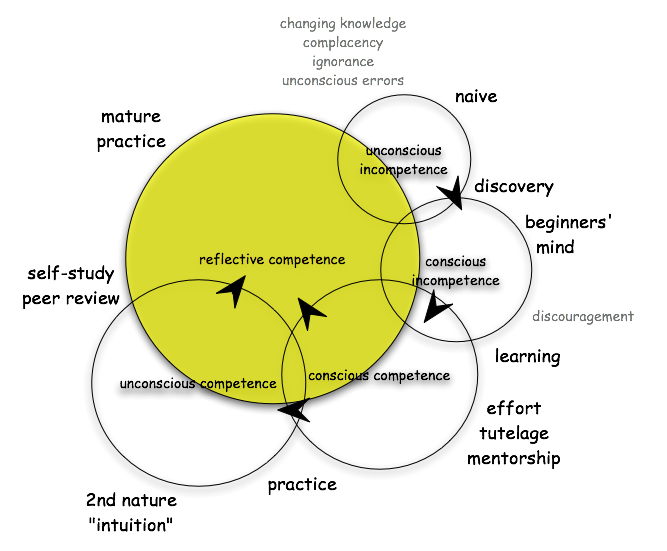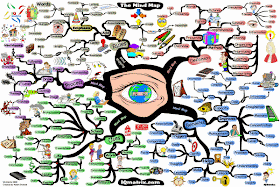Some interesting concepts for coaches, teachers or parents to understand when dealing with the developmental stages athletes and students are navigating while learning new skills.
03.15.09 Beginner's Mind
"In the beginner's mind there are many possibilities, but in the expert's there are few." Shunryu Suzuki-Roshi
(Courtesy of Will Taylor, Chair, Department of Homeopathic Medicine, National College of Natural Medicine, Portland, Oregon, USA, March 2007.)
The Four Stages for Learning a New Skill
The Crossfit methodology continually challenges us to expand our capabilities in a variety of facets. I found this model very interesting as it can pertain to just about any skill. We often don't think about the progressions we naturally experience as we strive to suck less. Being aware of these stages helps us better accept that learning can sometimes be a slow and frequently uncomfortable process.
Stage 1 - Unconsciously unskilled or incompetent . We don't know what we don't know. We are inept and unaware of it. We don't know we suck...
Stage 2 - Consciously unskilled or incompetent. We start to learn at this level when sudden awareness of how poorly we do something shows us how much we need to learn. We now know what we suck at...
Stage 3 - Consciously skilled or competent. Trying the skill out, experimenting, practicing. We now know how to do the skill the right way, but need to think and work hard to do it.
Stage 4 - Unconsciously skilled or competent. If we continue to practice and apply the new skills, eventually we arrive at a stage where they become easier, and given time, even natural. Firebreather!
The Four Stages for Learning a New Skill
The Crossfit methodology continually challenges us to expand our capabilities in a variety of facets. I found this model very interesting as it can pertain to just about any skill. We often don't think about the progressions we naturally experience as we strive to suck less. Being aware of these stages helps us better accept that learning can sometimes be a slow and frequently uncomfortable process.
Stage 1 - Unconsciously unskilled or incompetent . We don't know what we don't know. We are inept and unaware of it. We don't know we suck...
Stage 2 - Consciously unskilled or incompetent. We start to learn at this level when sudden awareness of how poorly we do something shows us how much we need to learn. We now know what we suck at...
Stage 3 - Consciously skilled or competent. Trying the skill out, experimenting, practicing. We now know how to do the skill the right way, but need to think and work hard to do it.
Stage 4 - Unconsciously skilled or competent. If we continue to practice and apply the new skills, eventually we arrive at a stage where they become easier, and given time, even natural. Firebreather!
---
http://www.petercoyote.com/zenmindcdx.jpg
Shunryu Suzuki (1905-1971) was a direct spiritual descendant of the great thirteenth-century Zen Master, Dogen. This inspiring work ranks with the great Zen classics, in a voice and language completely adapted to contemporary sensibilities. Suzuki's words breathe with the joy and simplicity that make a liberated life possible. As he reveals the actual practice of Zen as a discipline for daily life, one begins to understand what Zen is really about.
The practice of Zen mind is beginner's mind. The innocence of the first inquiry - what am I? - is needed throughout Zen practice. The mind of the beginner is empty, free of the habits of the expert, ready to accept, to doubt, and open to all the possibilities. It is the kind of mind that can see things as they are, which step by step and in a flash can realize the original nature of everything . This practice of Zen mind is found throughout the book. Directly or sometimes by inference, every section of the book concerns the question of how to maintain this attitude through your meditation and in your life. This is an ancient way of teaching, using the simplest language and the situations of everyday life.
---
The Beginner's Mind
By Peter Kaufman
http://www.everydaysociologyblog.com/2011/10/the-beginners-mind.html
In this book, Suzuki encourages us to have the beginner’s mind. What this means is that we should never feel as if we have something all figured out. We should always be hungry for more information and view ourselves as works in progress. I think one of the most basic ways to think about the beginner’s mind is to speak of intellectual curiosity—to have this insatiable desire to gain more knowledge and wisdom because we know there is so much more to learn. As Suzuki says, “In the beginner’s mind there is no thought, ‘I have attained something.’”
When most of us first entered school we epitomized the beginner’s mind. We were so excited to learn anything and everything. We had this unlimited intellectual curiosity. We were constantly asking questions such as: Why? How? When? Where? But after years of being told what we must learn, when we must learn, and how we must learn, much of this curiosity has been extinguished. And after years of memorizing the answers that teachers poured into our heads just so that we could regurgitate these answers on quarterly exams, many of us have actually come to dislike learning.
To make matters worse, we live in a hyper-competitive and hyper-individualistic culture where we are constantly vying to out-do each other and acting as if we know it all.
This makes many of us much more used to having an expert’s mind than a beginner’s mind. We have that “been there, done that” attitude. We feel as if once we’ve learned something or experienced something there is nothing more to be gained and we can move promptly onto the next topic. Or we think that just because we know someone’s characteristics—maybe their race, their gender, their sexuality, their social class or even their hobbies—we feel confident that we know what type of person they are and whether or not they are our kind of people.
These are all examples of the expert’s mind. At the very least, the expert’s mind results in narrow-mindedness and closed-mindedness where we shut others out and strengthen arbitrary borders instead of work together to build bridges. At the very worst, the expert’s mind results in prejudice, discrimination, fanaticism, and oppression—things we see all over the world each day.



No comments:
Post a Comment